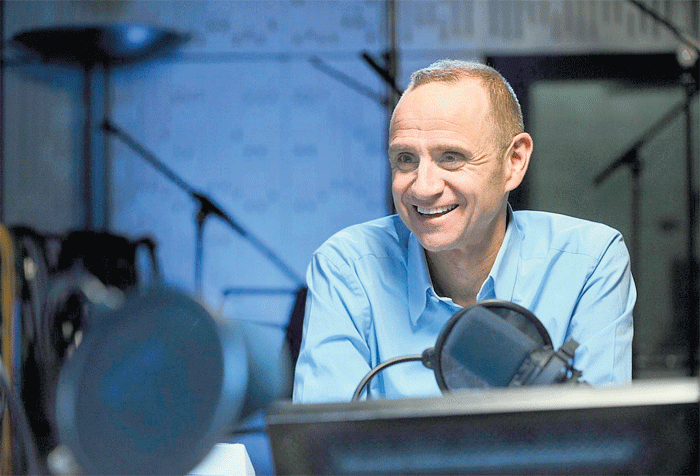A smart way to boost the image of business
‘The Bottom Line’ marries public broadcasting with public education

The format is simple: take three top business names, sit them around a table with the Dragons’ Den and Today presenter, Evan Davis – and record their conversation. The result is The Bottom Line, the place to hear the likes of Sir Richard Branson, Michael O’Leary, Sir Stelios Haji-Ioannou, Nicola Horlick and a host of other global high-flyers.
The series also has the distinction of being the first BBC radio programme to go multi-platform on television and the internet, in partnership with the Open University (OU). It’s an experiment which demonstrates how the boundaries between media are becoming increasingly blurred. You can listen to The Bottom Line on Radio 4, or you can watch it on television on the BBC’s News Channel and the BBC’s World News Channel, where the series has an estimated global audience of up to 15 million. Or you can download it as a podcast, or stream any of the past 12 months’ programmes via BBC iPlayer, or access Bottom Line video clips or blogs on a range of business topics.
You can watch the likes of Geoff Quinn, the chief executive of TMLewin, explaining why you shouldn’t be afraid to employ people who are better than you are, or James Hussey, the former chief executive of De La Rue, on the importance of not intimidating your colleagues. And if you’re an OU Business School student, you may find multiplatform material from The Bottom Line incorporated in your courses.
The Bottom Line started life as a Saturday evening discussion programme on Radio 4. Its mission was to bring into the public arena business leaders and ask them to explain how they think, the pressures they are under, how they make decisions, and their views on a whole range of topics.
“It’s about exposing the world to a class of people we don’t normally hear from, people who are running our companies and making important decisions,” says Davis, who has presented the since it began in 2006. “We could have put them on a game show or an interview programme, but we felt a conversation programme was a good way to get to know them and their businesses. It’s not so adversarial that it scares them or makes them unforthcoming.”
The series’ success prompted an idea: why not bring the cameras into the radio studio, and let the audience see the business leaders, as well as hear them? So the OU came on board to support the series’ transformation to a multimedia platform. For the university, it fitted perfectly with its own expanding use of multimedia in its teaching.
It has given the OU Business School a rich new vein of resources for its students, according to the school’s Dr Leslie Budd, a reader in social enterprise, who has recently taken over the role of academic adviser to the series from the OU’s professor of financial management, Janette Rutterford.
Just about all the topics covered in the programme turn up in OU Business School courses at some point, and students can be directed to relevant video clips, podcasts and blogs via course websites and electronic forums, he says. As well as giving students the opportunity to hear direct from the key players and experts, it also gives a topicality to their studies which pre-prepared study materials can’t replicate.
The Bottom Line also supports the OU’s wider public-education remit. “What’s good is that it attracts CEOs of international companies, and it does a lot in terms of public education in management,” Budd says. “People will talk to the BBC and the OU.
Those names have public resonance. It’s public broadcasting married with public education.”
And with its global reach, he believes The Bottom Line is helping to improve the image of business around the world. “British management in particular has had this caricature reputation for shorttermism and slashing costs. Now people can see these guys are much more thoughtful than the caricature suggests. The series has re-established the reputation of British management at the higher echelons.”
Technologically speaking, making a radio, television and internet show all at the same time has been a challenge, and spawned new ways of working. In the series’ Broadcasting House studio, two production teams and their equipment work cheek-by-jowl in a space designed for one.
It’s a new way of working for the OU academics, too. Because The Bottom Line is topical and advertised guests can change at short notice, they have to think on their feet. Budd taps out his online blog for the week on his laptop as he watches the programme being recorded. He also does a weekly video blog, which will be recorded straight after the programme, as does Davis.
“The BBC has never done anything like it before,” says Anne Stevens, the broadcast and learning executive at the OU’s Open Broadcasting Unit. “They would like to do more now, but it’s a question of finding a series that has the right format. It works for The Bottom Line because it’s just set up as an informal chat: the image you are looking at is like people sitting around a dinner table.
"There have been lots of emails from viewers saying they do like to see the guests – it does definitely add value. When you just hear someone, you have no notion of what they look like. You don’t see the body language and how they respond to each other.”
A new series of ‘The Bottom Line’ begins later this month. To see multi-platform materials, go to open2.net/bottomline
Join our commenting forum
Join thought-provoking conversations, follow other Independent readers and see their replies
Comments
Bookmark popover
Removed from bookmarks